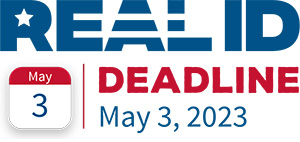About REAL ID
 The REAL ID Act establishes minimum security standards for license issuance and production and prohibits certain federal agencies from accepting for certain purposes driver’s licenses and identification cards from states not meeting the Act’s minimum standards. The purposes covered by the Act are: accessing certain federal facilities, entering nuclear power plants, and, boarding federally regulated commercial aircraft.
The REAL ID Act establishes minimum security standards for license issuance and production and prohibits certain federal agencies from accepting for certain purposes driver’s licenses and identification cards from states not meeting the Act’s minimum standards. The purposes covered by the Act are: accessing certain federal facilities, entering nuclear power plants, and, boarding federally regulated commercial aircraft.
The Department of Homeland Security (DHS) announced on December 20, 2013 a phased enforcement plan for the REAL ID Act (the Act), as passed by Congress, that will implement the Act in a measured, fair, and responsible way.
Secure driver's licenses and identification documents are a vital component of our national security framework. The REAL ID Act, passed by Congress in 2005, enacted the 9/11 Commission’s recommendation that the Federal Government “set standards for the issuance of sources of identification, such as driver's licenses.” The Act established minimum security standards for license issuance and production and prohibits certain federal agencies from accepting for certain purposes driver’s licenses and identification cards from states not meeting the Act’s minimum standards.
DHS is committed to enforcing the REAL ID Act in accordance with the phased enforcement schedule and regulatory timeframes. It has been 16 years since the REAL ID Act was passed and half of all the states have already met the REAL ID minimum standards.
The Act does not require individuals to present identification where it is not currently required to access a federal facility (such as to enter the public areas of the Smithsonian) nor does it prohibit an agency from accepting other forms of identity documents (such as a U.S. passport or passport card).
The Act’s prohibitions do not affect other uses of driver’s licenses or identification cards unrelated to official purposes as defined in the Act.
Passed by Congress in 2005, the REAL ID Act enacted the 9/11 Commission's recommendation that the Federal Government “set standards for the issuance of sources of identification, such as driver's licenses.” The Act established minimum security standards for state-issued driver's licenses and identification cards and prohibits certain federal agencies from accepting for official purposes licenses and identification cards from states that do not meet these standards. These purposes are:
- Accessing certain federal facilities
- Boarding federally regulated commercial aircraft
- Entering nuclear power plants
The enforcement date is May 3, 2023.
Federal agencies, including DHS and TSA, may only accept state-issued driver’s licenses and identification cards as identification for purposes of accessing federal facilities - including TSA airport security checkpoints - if the license or card was issued by a REAL ID compliant state in accordance with the REAL ID security standards (meaning the license or card must include the REAL ID compliant star marking). Enhanced Driver’s Licenses (EDL) issued by Washington, Michigan, Minnesota, New York, and Vermont are considered acceptable alternatives to REAL ID-compliant cards and will also be accepted for official REAL ID purposes. Most EDLs do not contain the star marking and this is acceptable.
DHS is working closely with all states and territories to provide assistance and guidance to achieve full compliance by the May 3, 2023 deadline. As of March 26, 2021, 55 states and territories are fully compliant with the REAL ID requirements, and all states are on track to begin issuing compliant licenses and IDs by the May 3, 2023 deadline.
Visit your state’s driver’s licensing agency website to find out exactly what documentation is required to obtain a REAL ID. At a minimum, you must provide documentation showing: 1) Full Legal Name; 2) Date of Birth; 3) Social Security Number; 4) Two Proofs of Address of Principal Residence; and 5) Lawful Status.
States may impose additional requirements, so check with your state’s driver’s licensing agency website, before visiting them in person, for additional guidance and assistance.






.jpg)
.jpg)



No hay comentarios.:
Publicar un comentario
Cualquier duda o inquietud, no dudes de expresarla, aqui.